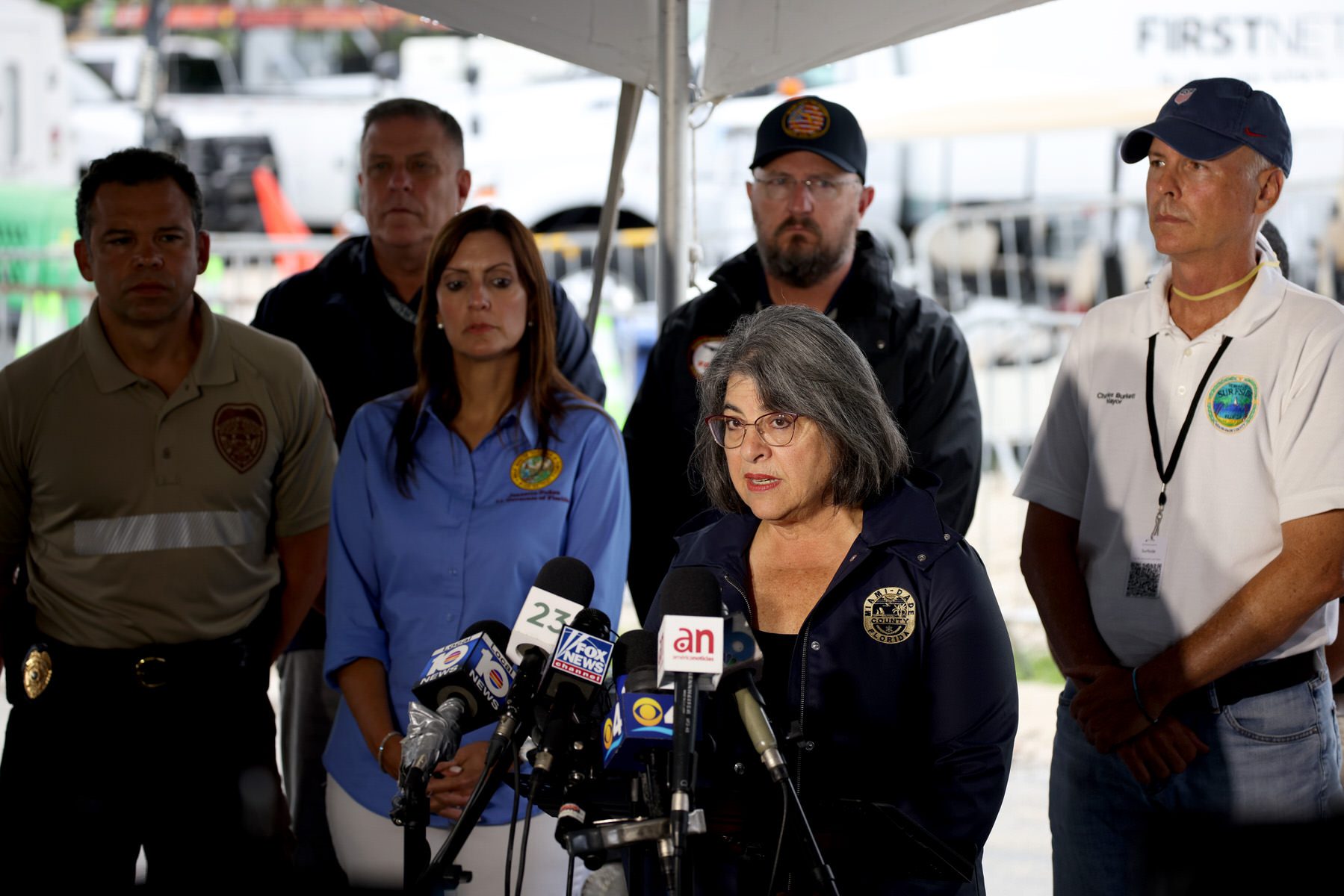Daniella Levine Cava remembers when her job as mayor of Florida’s Miami-Dade County came into sharp focus. It was the first hours after a condo building partially collapsed on June 24 in Surfside, and she was visiting a center set up for residents and loved ones of those missing.
“I saw people who were displaced lying on mats on the floor in despair,” she said. “And it hit me. ‘I am responsible for what happens to these people.’ It never left me.”
For several weeks, Levine Cava became a familiar face at daily news conferences, reading the names of people recovered from the building collapse — which ultimately killed 98 people and is considered one of the deadliest structural building failures in history. An investigation into what caused the collapse is underway.
Levine Cava is among the policymakers trying to determine what happens next. She immediately called for a review of older buildings under the county’s jurisdiction. She said the county hired additional building inspectors and code enforcement officials and urged cities to do their own audits. She said officials have been gathering expert feedback about necessary improvements to buildings.
She has met more recently with local, state and federal officials, a collaboration she expects will continue in the months ahead.
“I want it to be as efficient and effective as possible,” Levine Cava said of the policy work to come. “We’ve already moved forward with changes within our office. We’ve hired up additional building inspectors and code enforcement input officials. We’ve urged cities to do their own audits, which many of them have done. So, yes, we’re gonna move forward aggressively to create a sense of confidence, reduce the anxiety, make sure that this would not happen again because we would not be unaware.”
Leading the most populous county in Florida is something Levine Cava, the first woman elected mayor of the county, eased into. She didn’t run for political office until she was in her late 50s. (She was first elected to the county commission in 2014.) Then, when the opportunity presented itself, she ran for mayor.
“As county commissioner, I was able to do a good number of things, but I also was stymied in making some of the bigger changes that I thought were necessary for the future. I looked around and I decided there was really nobody else that I trusted to take on the challenge, and that it was really my responsibility to step up,” she said.
Now 65, Levine Cava’s first year as mayor has been partially defined by several crises: the COVID-19 pandemic, extreme weather including powerful hurricanes, and the response from a diverse community to ongoing politics in Cuba and Haiti.
Levine Cava spoke with The 19th on about the emergency response lessons from Surfside and what she hopes comes next in the investigation.
This interview has been edited for length and clarity.
The 19th: There’s a lot that has happened over the last couple of weeks, not just what happened in Surfside but various ongoing political dynamics with Latin America, COVID-19 and the Delta variant, just general severe weather that comes with living in Miami Dade. It’s a lot more than a mayor might experience in the totality of their career. How have you come to understand the realities of that, of the fact that you have had a lot happen to you as a policymaker in a short window of time?
Levine Cava: I didn’t run for office until I was 59 years old … I had been working outside government for social change and enjoyed that role and felt that I was making a difference there. But finally running for office, I do think that it was personally possible for me to run and win because of the wisdom that I had learned over the years. Not just the knowledge of issues, the knowledge of community, the relationships. But, basically, a calmness. Many people commented that Surfside, one of the things they appreciated was that I was calm. My daughter said to me, ‘Mom: Calm, competent and compassionate.’ So I think that what has happened is that I am ready to take on challenges that maybe earlier in my career I was not.
I’m curious if there’s been moments of clarity over the last couple of weeks that have impacted how you view your work as mayor.
There’s never been a woman mayor and a woman leading in emergencies like this. And so I think that Surfside created that opportunity to showcase a different kind of leadership, which hopefully now gives me greater credibility to deal with the other challenges that I have, many of which are just pure politics. So that’s what I’m counting on. I’m planning to build on that goodwill, the political and social capital that comes out of this difficult time.
I’m curious about the narrative that you have broken a glass ceiling by being the first woman in this role. How has your gender played a role just in general with the job, and then, whether that’s also continuously evolving even through the last couple of weeks?
I really never encountered real barriers in my life or career being a woman until I came into politics. This is the first time that I really saw the masculine frame of power. And I believe that there’s a new kind of leadership needed in the world today: one that is more inclusive, more compassionate. And that doesn’t require a woman, but basically it’s not what’s considered a traditional male form of leadership.
I was getting a lot of pressure when I came into office to behave more like a man. It was giving me real heartburn. And I think, again, that Surfside was an example where people came to see that I could be both tough and tender, that I could lead like a woman.
I want to better understand whether there’s anything that people get wrong about your approach to being mayor, whether there’s anything misunderstood about you and how you think gender may play a role in that.
I am a very thoughtful person. I really like to have a lot of information to make decisions. I really like to spend a lot of time consulting, getting input. And a lot of politics is not really conducive to that. So I think people might think of that as a waste of time or unnecessary. But for me, it’s extremely necessary because it creates ownership. I need people to own the decisions. I don’t ever want to be dictatorial. People have to be part of the solution to fully support it. So maybe that’s misunderstood.
It’s been two months since the Surfside building collapsed. What is going through your mind? How are you feeling, as a local leader, about everything that’s happened?
So the first month was about finding the victims, helping families have closure and helping the survivors to move on with their lives. That consumed me 24/7.
Once the 98th victim was identified, we moved into that next phase. And that was when I think I could truly absorb the enormity of what had happened. It’s been very emotional.
Look: A year and a half of COVID; now two months of Surfside; Cuba, and the impact on our community; hurricanes — there’s been many other things. I told you earlier I’m prepared for it. I like to solve problems, and I like to bring people together to solve problems. I’ve had lots of opportunities to do that.
But at the same time, there’s the impact. I do feel very sad about so many of the things that we’re going through. As a community, as a nation, as a world, we’re enduring so much: climate change, dislocations. It’s very huge what’s happening in the world. Very destabilizing.
I sit with that sadness. I sit with the unimaginable tragedy of a building falling down while people are asleep in their beds, and then the inability to save those lives. The loss of the homes and all of the belongings of those survivors, too. Tragedies do happen, and natural disasters happen, but this was just an unimaginable one. It also creates huge anxiety, because now everybody wonders, ‘What about my building? How do I be safe?’ It just raises so much uncertainty, anxiety.
We’re living in a time that is just filled with sadness and uncertainty. As well as, of course, many other wonderful things. And so I view my job as a leader to tell the truth, but still give people hope for the future. And that is what I sit with and that I view as a mission — to always be open, transparent with people about the enormity of the tasks. But also, you cannot live without hope. So, I have hope in the midst of all of this, and I think in general, we can all find that hope.
In this second month, how have you spent time processing? Everyone processes things differently, and you had such a very unique position in all of this because you were communicating with first responders and families and also had a camera in front of you every day.
I think there’s so much for us, and for the world, to learn from how we handled Surfside. I feel it’s always important to learn and to move forward with those lessons. And this tragedy did show the world how people can come together to work across politics, across jurisdictions, across religions, nationalities, ethnicities. To have a whole of government, a whole of community, response to a very startling crisis. I am so proud of how that happened, and how we kept that coalition together through that month, focused unsparingly on the needs of those who were directly affected.
It was like a beautiful orchestra coming together: The firefighters that rescued them from the building balconies; the searchers who went on the pile; the religious leaders who stepped up to provide solace to those affected; the police who provided safety and now investigation; the cities; the national and the international groups that came to our aid; the outpouring of donations and prayers from around the world; the media that was there with us day in and day out and living it personally.
It was a gift of a moment that shows the best of what we have to offer in times of crisis. So I believe that there are many, many lessons to be learned about how that happened, and why that happened, to make sure that we can capture that for future crises.
Is there anything very specific [to policy changes], with support from other policymakers, you can get done through your role?
Well we have added these inspectors. We’re looking at some internal changes like earlier notification [for building inspections] — this is without legislative change. We can signal and be more aggressive about the timelines. And we’re always reviewing for safety. I feel pretty confident that the county has good safety protections in place for the county buildings. But we want to be more proactive in signaling and anticipating. Of course we all want to know exactly what happened in this building. I am afraid that that will take a while to really untangle. But it does seem that there were some plans that were approved, and that maybe were not adequate and also some plans that were not executed.
Anything else?
I ran for office at, I told you, 59, and a very strong motivation for me was that people don’t trust government. And that to me is tragic. It speaks to the state of our democracy, and this corrosive attempt to undermine government and say it’s all corrupt or incompetent is very sinister and cynical. So I ran to restore trust in government, very simply. I do think that the world, in watching what happened at Surfside, felt confident that government was doing a good job, that government was playing a critical and effective role in this tragedy. That gives me great hope, and that’s what I take to the bank. I received over 100 cards from all around the country, handwritten cards, people telling me how much they appreciated how Surfside was handled. And the fact that people saw that and took the time, just means so much to me. I feel very inspired by people’s caring.







